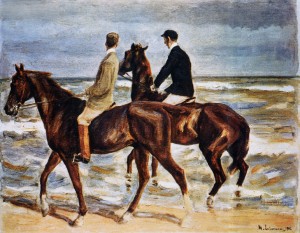Cousin Had Challenged His Capacity to Make a Will Shortly Before 2014 Death
After a two-year legal battle, the Oberlandesgericht in Munich has upheld the dismissal of Uta Werner’s challenge to the will made by Cornelius Gurlitt in 2014 that designated the Kunstmuseum Bern as his heir, including the bequest of his controversial painting collection. Less than six months after it was revealed in November 2013 that the Bavarian authorities had seized 1,280 objects from his Schwabing home in Munich, Gurlitt wrote a will that designated that his entire collection would go to the Swiss museum. Barring some extraordinary appeal, the bequest will now be final and the collection will go to Switzerland. While lifting considerable uncertainty about the fate of the collection as a whole, this development does not address the lack of clarity about the process by which the objects that are suspected of having been looted by the Nazis will be examined or returned.
Read More
Topics:
Bayern,
Hildebrand Gurlitt,
Cornelius Gurlitt,
Nazi-looted art in Munich,
SZ,
Uta Werner,
Nazi-looted art,
Oberlandesgericht,
Munich,
Sueddeutsche Zeitung,
Gurlitt,
NS Raubkunst,
Catrin Lorch,
Free State of Bavaria,
Kunstmuseum Bern,
Washington Principles,
Jörg Häntzschel,
Bürgerliches Gesetzbuch (BGB)
Two weeks ago, the Federal Republic of Germany and Bavaria moved to dismiss the restitution claims brought by David Toren over ownership of Two Riders on the Beach (Zwei Ritter am Strand) by the German painter Max Liebermann. Toren’s uncle David Friedmann owned the painting in Breslau before he was targeted for his collection and it was stolen. Toren had not seen it since adolescence. The painting is further notable for two (related) reasons: it is among the 1,280 works of art found in Cornelius Gurlitt’s apartment in 2012, and it is one of only two that the Gurlitt Task Force has recommended be restituted (to Toren). As we noted at the time of the motion, Germany’s tactics seemed odd; Bavaria has committed to complying with the Task Force’s recommendations, and contesting this case seems to make little sense. The likeliest reason, in our view, is to try to make some jurisdictional law that will weaken other potential claimants to the Gurlitt trove.
Read More
Topics:
Schwabinger Kunstfund,
Hildebrand Gurlitt,
Cornelius Gurlitt,
Breslau,
Max Liebermann,
Germany,
Silesia,
Gurlitt Collection,
Foreign Sovereign Immunities Act,
bailment,
Entartete Kunst,
FSIA,
Restitution,
Bavaria,
David Toren,
Zwei Ritter am Strand,
Free State of Bavaria,
28 U.S.C. § 1605(a)(2),
Looted Art,
World War II,
Foreign Sovereign Immunities,
Altmann v. Republic of Austria,
Freistaat Bayern,
Kunstmuseum Bern,
Riders on the Beach,
Federal Republic of Germany,
Raubkunst,
David Friedmann,
Münchner Kunstfund
To date, only one lawsuit has been filed in the United States related to the seizure from Cornelius Gurlitt’s apartment of some 1,280 works of art, a story that broke a year ago with the concern about the objects’ Nazi-looting connections via his father Hildebrand Gurlitt (the view here last winter was that the longer Germany failed to address the situation comprehensively, the more likely such U.S. litigation became). That lawsuit, brought by David Toren, seeks the return of Two Riders on the Beach (Zwei Ritter am Strand), by Max Liebermann. Germany and Bavaria moved to dismiss the case yesterday, which is particularly puzzling given that among the very few determinations made by the Gurlitt Task Force (in August), it is that the Liebermann should be returned. The cynical view is that they are looking to forestall future claims, but it is past time for the painting to be returned.
Read More
Topics:
Schwabinger Kunstfund,
Hildebrand Gurlitt,
Cornelius Gurlitt,
Breslau,
Max Liebermann,
Germany,
Silesia,
Gurlitt Collection,
Foreign Sovereign Immunities Act,
bailment,
Entartete Kunst,
FSIA,
Restitution,
Bavaria,
David Toren,
Zwei Ritter am Meer,
Free State of Bavaria,
28 U.S.C. § 1605(a)(2),
Looted Art,
World War II,
Altmann v. Republic of Austria,
Freistaat Bayern,
Kunstmuseum Bern,
Riders on the Beach,
Federal Republic of Germany,
Raubkunst,
David Friedmann,
Münchner Kunstfund
The U.S. District Court for the Southern District of New York has dismissed claims for ownership of Madame Soler by Pablo Picasso, currently at the Pinakothek der Moderne in Munich. Just as the relevance of Judge Jed Rakoff’s comments over another art restitution case brought by the heirs of Paul von Mendelssohn Bartholdy unexpectedly came to the fore recently, Judge Rakoff’s decision is now the most recent in a line of frustrations for the heirs of Mendelssohn Bartholdy, a victim of Nazi persecution in Berlin in the 1930s. The ramifications of this case may be fairly narrow, however, as the case was premised on allegations of specific transactions in New York rather than general allegations about the conduct of Germany. The claimants could appeal, or perhaps turn to the Limbach Commission if they could be heard (the Pinakothek is a subdivision of Germany for jurisdictional analysis, but it’s unclear at first blush if the Commission would view this claim as within its province).
Read More
Topics:
Paul von Mendelssohn Bartholdy,
Berlin,
commercial activity exception,
Cornelius Gurlitt,
Florence Kesselstatt,
Judge Jed Rakoff,
Halldor Soehner,
Saint-Jean-Cap-Ferrat,
Julius Schoeps,
Upper East Side,
Prussia,
Max Liebermann,
Night Café,
Gurlitt Collection,
Foreign Sovereign Immunities Act,
Preussen,
France,
State Paintings Collection,
Madame Soler,
Museum of Modern Art,
Edelgard von Lavergne-Peguilhen,
Van Gogh,
Munich,
Justin K. Thannhauser,
FSIA,
expropriation exception”,
Nazi persecution,
Boy Leading a Horse,
Restitution,
David Toren,
Bayerische Staatsgemäldesammlung,
Bavarian State Ministry for Education and Culture,
Free State of Bavaria,
World War II,
Foreign Sovereign Immunities,
Pinakothek der Moderne,
Bayerisches Staatsministerium für Bildung und Kult,
Bundesländer,
Altmann v. Republic of Austria,
Freistaat Bayern,
Le Moulin de la Galette,
Kurt Martin,
München,
Pablo Picasso,
Federal Republic of Germany,
Limbach Commission,
Wissenschaft und Kunst





